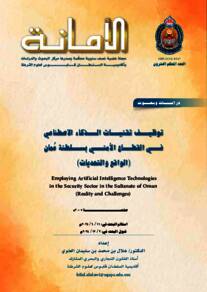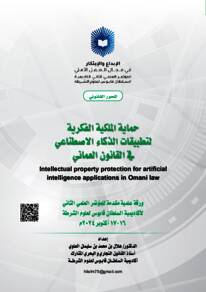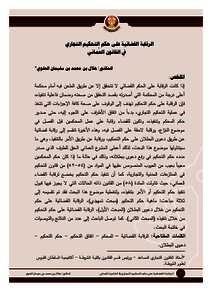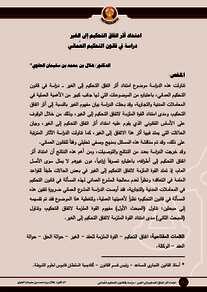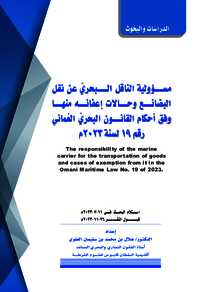Document
توظيف تقنيات الذكاء الاصطناعي في القطاع الأمني بسلطنة عُمان : الواقع والتحديات.
Source
الأمانة. ع. 45. ص. 7-51.
Other titles
Employing artificial intelligence technologies in the security sector in the Sultanate of Oman : (reality and challenges)
Country
عمان.
City
نزوى
Publisher
أكاديمية السلطان قابوس لعلوم الشرطة
Gregorian
2025
Language
Arabic
Subject
English abstract
This study aims to shed light on artificial intelligence, to understand the concept
of this modern technology, and the extent to which the Sultanate of Oman benefits
from its various applications in security work. It also addresses the challenges facing
the use of artificial intelligence techniques in security work, and ways to confront
them. The study relied on the descriptive approach, through which the focus was on
defining artificial intelligence and its various technologies, explaining its importance
in the field of security work, and the challenges facing benefiting from its various
applications in the Sultanate. Researcher also followed the analytical approach,
which is the approach that is based on collecting facts and information from their
primary sources, analyzing and organizing them for the purpose of achieving the
research objectives and arriving at the most important results and recommendations
that contribute to strengthening the security work system using modern technology.
The study reached a set of results, most notably the Sultanate of Oman’s keenness to
employ artificial intelligence techniques in the security work sector, out of its belief in
the importance of supplying this vital sector with advanced technology and modern
techniques. The study also showed the diversity of areas of use of artificial intelligence
technologies in the security field, such as: predictive policing, mine detection
programs, facial recognition, drones, robots, etc., and that most artificial intelligence
applications were designed for commercial purposes, which may pose a difficulty in
employing them in the security field. In addition, the extent to which the use of some
artificial intelligence applications conflicts with the rights guaranteed by international
laws, charters, treaties and agreements, such as violating the right to privacy, including
monitoring communications and social media accounts, and freedom of expression
of opinion. Finally, the research concluded with a number of recommendations, the
most important of which is working to employ artificial intelligence applications in
the security work sector, in a way that ensures that human privacy and freedom and
the laws regulating them are not violated, with the necessity of qualifying and training
Omani cadres in the field of artificial intelligence techniques, and employing them in
the security field. To keep pace with global developments in this field.
ISSN
2412-8317
Hijri
1446
Arabic abstract
تهدف هذه الدراسة إلى تسليط الضوء على الذكاء الاصطناعي، للوقوف على مفهوم هذه التقنية الحديثة، ومدى استفادة سلطنة عُمان من تطبيقاتها المختلفة في العمل الأمني، كما أنها تتناول التحديات التي تواجه توظيف تقنيات الذكاء الاصطناعي في العمل الأمني، والسبل الكفيلة لمواجهتها. وقد اعتمدت الدراسة على المنهج الوصفي الذي تم من خلاله التركيز على تعريف الذكاء الاصطناعي وتقنياته المختلفة، وبيان أهميته في مجال العمل الأمني، والتحديات التي تواجه الاستفادة من تطبيقاته المختلفة في المُجمل. كما اتبع الباحث المنهج التحليلي، وهو المنهج الذي ينهض على جمع الحقائق والمعلومات من مصادرها الأولية وتحليلها وتصنيفها بغرض تحقيق أهداف الدراسة والوصول إلى أهم النتائج والتوصيات التي تساهم في دعم منظومة العمل الأمني بوسائل التقنية الحديثة. وقد توصلت الدراسة إلى مجموعة من النتائج أبرزها حرص سلطنة عُمان على توظيف تقنيات الذكاء الاصطناعي في قطاع العمل الأمني إيمانًا منها بأهمية رفد القطاع الحيوي بوسائل التكنولوجيا المتقدمة، وتقنياته الحديثة، كما أوضحت الدراسة تنوع مجالات استخدام تقنيات الذكاء الاصطناعي في المجال الأمني مثل: الشرطة التنبؤية، وبرامج الكشف عن الألغام، والتعرف على الوجه والطائرات بدون طيار، والروبوتات، وغيرها. وأن أغلب تطبيقات الذكاء الاصطناعي صممت لأغراض تجارية، مما قد يشكل صعوبة في توظيفها في المجال الأمني، علاوة على ذلك صعوبات تتعلق بتعارض بعض تطبيقات الذكاء الاصطناعي والحقوق التي كفلتها القوانين والمواثيق والمعاهدات والاتفاقات الدولية، كالمساس بالحق في الخصوصية، ومن بين ذلك مراقبة الاتصالات وحسابات وسائل التواصل الاجتماعي وحرية التعبير عن الرأي. وأخيرًا، خلص البحث إلى عدد من التوصيات من أهمها العمل على توظيف تطبيقات الذكاء الاصطناعي في قطاع العمل الأمني، وذلك بما يضمن عدم انتهاك خصوصية الإنسان وحرية القوانين المتعلقة لها، مع ضرورة تأهيل وتدريب الكوادر البشرية في مجال تقنيات الذكاء الاصطناعي، وتوظيفها في المجال الأمني لمواكبة التطورات العالمية في هذا المجال.
Category
Journal articles

